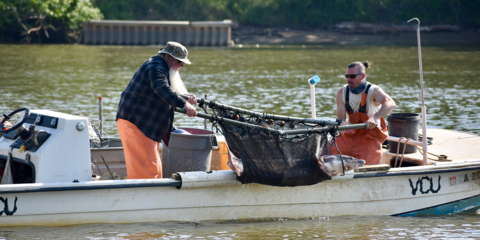BELLEVUE, Wash. & CHARLES CITY, Va.– The Virginia Commonwealth University (VCU) Rice Rivers Center is using the power of 5G to transform conservation for the federally endangered Atlantic sturgeon. Today, T-Mobile (NASDAQ: TMUS) announced that VCU Rice Rivers Center is using T-Mobile 5G to protect this prehistoric species, while setting a new benchmark for environmental preservation along the James River.
Once fished to near extinction, the James River sturgeon population near Richmond, Virginia, still faces an ongoing threat from power plant cooling water intake systems. But thanks to advancements in tracking technology using telemetry receivers, particularly with tagged female sturgeon, the Center can notify the plant when these fish enter their spawning habitat to lay eggs. This allows the plant to decrease or stop water intake, helping safeguard this vulnerable species.
T-Mobile’s award-winning 5G network plays a pivotal role in the Center’s conservation efforts by linking acoustic receivers to an aquatic hub, enabling real-time tracking of sturgeon movements, even in remote areas of the James River. Additionally, T-Mobile’s IoT Control Center empowers VCU to streamline SIM card management in the receivers, optimizing data transmission, reporting and device oversight. These capabilities enhance both research accuracy and operational efficiency for more impactful conservation outcomes.
“The work we’re doing with T-Mobile has digitally transformed how we protect the endangered Atlantic sturgeon,” said Matt Balazik, Ph.D., Research Faculty, VCU Rice Rivers Center. “Real-time data allows us to make critical, well-informed decisions that directly safeguard the species, while also educating the next generation of environmental stewards.”
“At T-Mobile, we believe in the power of technology to create powerful outcomes, and our collaboration with VCU is a perfect example of that,” said George Fischer, SVP of Sales, T-Mobile Business Group. “By powering secure real-time data transmission, we’re helping to safeguard critical habitats and educate future generations. Together, we’re setting a new standard for environmental sustainability and ensuring that these ancient fish thrive in the James River for years to come.”
The Center’s project, currently the largest real-time acoustic telemetry system on the East Coast of the U.S., is making a global impact. To offer a model for conservation that can be widely adopted, the Center showcases its telemetry data to researchers worldwide, including at institutions like the ZSL (Zoological Society of London), as well as local schools, where students are introduced to conservation efforts through live demonstrations of sturgeon-tracking data.
VCU is also developing a website that will allow students and educators to access past telemetry data, incorporating it into lesson plans and projects. This initiative will provide all schools with the ability to contribute to the growing field of environmental research.
The Center is exploring the use of artificial intelligence (AI) to analyze data and predict sturgeon movements more accurately. While current predictions can only forecast a day or two in advance, future AI developments could give power companies additional time to adjust water intake flows and better protect the sturgeon population.
This forward-looking approach, connected by T-Mobile, ensures the project will continue to evolve, further helping to protect the sturgeon’s future in the James River.


